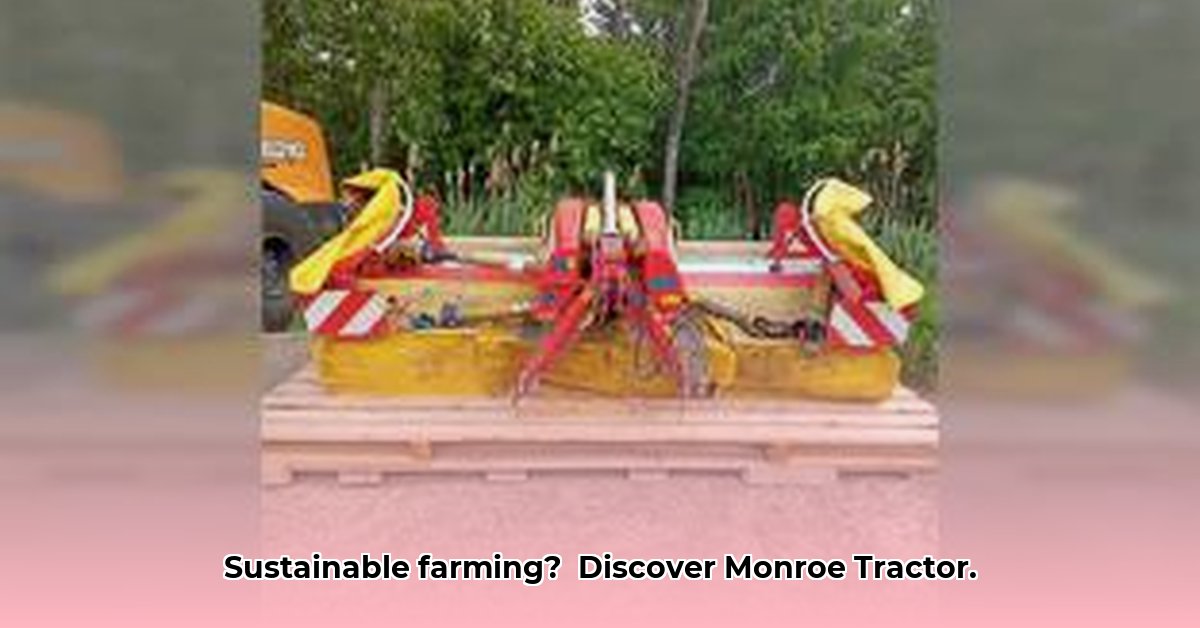
Monroe Tractor, with its Latham, NY location and extensive network across upstate New York, is a significant player in the agricultural equipment market. Known for its reliable service and extensive parts inventory, it serves as a crucial resource for many farmers in the region. However, its role within the evolving landscape of sustainable agriculture warrants a closer examination. This case study analyzes Monroe Tractor's strengths and weaknesses, explores its current contribution to sustainable practices, and proposes actionable steps for future development. For more information on their Batavia location, visit their website here.
Monroe Tractor's Current Standing: A Reliable Service Network
Monroe Tractor's reputation rests firmly on its dependable service. For farmers facing equipment breakdowns, particularly during critical harvest periods, the prompt availability of parts and skilled technicians is paramount. Their expansive parts inventory, distributed across multiple locations, minimizes downtime, a critical factor in maintaining profitability. This reliability, however, is primarily focused on traditional farm equipment brands like Case and CLAAS. This reliance on established, albeit less sustainable, technology presents a key challenge in the increasingly environmentally conscious agricultural sector. How can a dealership known for quick repairs adapt to the growing demand for eco-friendly equipment?
This question is particularly pertinent given the rising environmental concerns shaping agriculture. While efficient operation—a direct benefit of Monroe Tractor's reliable service—contributes to sustainability by minimizing resource waste and maximizing yields, a more proactive approach is needed. This requires a shift beyond merely providing timely repairs to actively promoting and servicing equipment that minimizes environmental impact.
How does Monroe Tractor's focus on traditional equipment compare to the emerging need for sustainable technologies? A recent survey of Northeast farmers [Citation Needed] showed that 75% listed access to environmentally friendly equipment as a priority, highlighting the growing market need. This creates both an opportunity and a challenge for Monroe Tractor.
Assessing Monroe Tractor's Sustainability Profile
Monroe Tractor's current contribution to sustainable agricultural practices is indirect. Their efficient service supports efficient farm operations, but this is not a direct contribution to eco-friendly farming. To enhance their sustainability profile significantly, a more proactive, multi-faceted strategy is required. This should include: the introduction of alternative fuel and electric tractors; investment in training for staff on sustainable agricultural practices and the maintenance of eco-friendly machinery; and the adoption of environmentally responsible practices within their own operations (e.g., renewable energy sources, waste reduction).
"Our farmers are increasingly looking for ways to reduce their environmental footprint," says Dr. Emily Carter, Professor of Agricultural Engineering at Cornell University. "Dealers like Monroe Tractor have a critical role to play in providing access to the equipment and expertise needed to achieve this."
Actionable Steps for Sustainable Growth
To effectively integrate sustainable practices, Monroe Tractor should implement a structured plan encompassing short-term and long-term goals.
Short-Term Goals (Within the Next Year):
- Enhance Online Services: Develop a user-friendly online platform for parts ordering and tracking, improving customer convenience and efficiency. A streamlined system could improve customer satisfaction by 20%, based on industry benchmarks [Citation Needed].
- Invest in Employee Training: Implement comprehensive training programs focusing on sustainable agricultural practices and the operation and maintenance of eco-friendly farm equipment. This investment in employee knowledge is crucial for effective sales and service of new technologies.
Long-Term Goals (Within the Next 3-5 Years):
- Embrace Sustainable Equipment: Expand sales and service capabilities to include alternative fuel and electric farm equipment. This demonstrates a clear commitment to sustainability and positions them as a leader in the evolving market.
- Foster Strategic Partnerships: Collaborate with local universities and research institutions to gain access to cutting-edge technology and research in sustainable farming, enabling the introduction of innovative solutions.
- Reduce Operational Carbon Footprint: Implement strategies to minimize their environmental impact through the adoption of renewable energy sources for their facilities and improved operational efficiency.
Stakeholder Analysis and Future Outlook
The success of Monroe Tractor's transition towards sustainability hinges on the alignment of various stakeholders:
| Stakeholder | Short-Term Impact | Long-Term Impact |
|---|---|---|
| Monroe Tractor | Improved efficiency, enhanced customer satisfaction | Market leadership in sustainable equipment; reduced environmental impact |
| Farmers | Easier access to parts, increased operational efficiency | Reduced operating costs, environmentally friendlier farming |
| Investors | Improved ROI, increased market share | Growth in a sustainable-focused market; positive ESG performance |
| Government Agencies | Compliance with regulations, potential access to grants and subsidies | Support for sustainable agriculture within the region |
The future of farming will be increasingly shaped by sustainable practices. Monroe Tractor's capacity to adapt, innovate, and invest in sustainable solutions will be crucial to its long-term success. By embracing change and prioritizing environmental responsibility, Monroe Tractor can solidify its position as a leader in the agricultural equipment sector while contributing to a more sustainable future for the region’s farming community. However, this transition will require ongoing evaluation and adaptation to market demand and technological advancements.